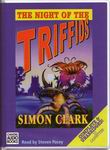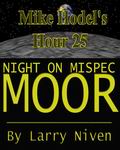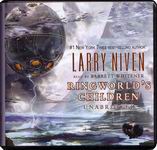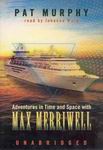
 Legends II: Volume One
Legends II: Volume One
Edited by Robert Silverberg; Stories by George R.R. Martin & Anne McCaffrey
Read by Graeme Malcolm & Alyssa Bresnahan
3 Cassettes – 5.25 hours [UNABRIDGED]
Publisher: Random House Audio
Published: 2004
ISBN: 0739310828
Themes: / Fantasy / Series / Collection / Dragons / Knights / Royalty /
The tag line to this audio book is “New short novels by the masters of modern fantasy”. Would it have knocked out any teeth to use the word “novella?” It’s like calling a pack of number 2 pencils “a pallet of light-duty lumber.” A novella is not merely a novel that was born sickly or abstained from performance-enhancing drugs; it is a distinct literary form with a tighter focus in theme, setting, character, and time. Has the novella become such a bane to publishers that they seek to disguise it with a new name, as politicians have disguised the apocalypse of global warming with the ambivalence of climate change? I hope not. The literary form of Goethe, Conrad, Silverberg and Leiber still has a lot to offer us today. Its name should be spoken with pride, and its name-bearers sold, bought and read (or listened to) without shame.
A great place to start is George R.R. Martin’s “A Song of Ice and Fire: The Sworn Sword”, which is a fine example of a fantasy novella. It is tightly focused on a single, weighty event in time: The final clash between the proud, nearly-extinguished ser Eustace, and the desperately aggressive Lady Webber. Caught in the middle are our protagonists: Dunk, the simple knight with a sense of right and wrong that supersedes his own pride and safety, and Egg, whose compassion for even the lowest grows every time we see him. Heraclitus proposed that character determines destiny, and this is certainly true here. Everything that occurs within Martin’s tough, gritty, complex tale feels like an inevitable result of the characters and their choices. For those looking for lots of sword-banging, spell-casting action, this isn’t the place to find it. This story deals more in verbal confrontation, shades of revealed truth, and the nature of honor and treachery. My only quibble is that the ending, hard-won as it is, is a little pat, especially after the moral ambiguity of Dunk and Egg’s first story “The Hedge Knight” and the foregoing mass of this one. But given everything else about this absorbing tale, hewn from the same wood as the rest of the Song of Ice and Fire, this is a very minor point.
Martin’s pacing is slow and deliberate, shining a light into all the crevices of the personal, moral and physical terrain covered here. Graeme Malcolm’s reading is fittingly unhurried and considered. A British accent is a must for high fantasy like this (in my opinion), and Malcolm’s is dignified and readily intelligible to the American ear. There is even a compelling, extensive introduction to tune your ear to it. I think you’ll enjoy Malcolm’s voice characterizations, as well, as they are subtle, yet distinct, and seem well matched to the characters. Some music is present, mostly as punctuation between the book title, the introductory material, and the story itself, which is helpful. It also accompanies the brief prologue and epilogue to the story, which is not helpful, but also not too distracting.
Anne McCaffrey’s story “Pern: Beyond Between” is much less successful. It seems less a novella (let alone a wee novel) than a doughy short story that got rolled out a little too thin. The main ingredient is the disappearance of Lessa and Hoth into the great unknown of Between, but sifted in are travels in space, time, and Between; a few changes in viewpoint; and even a digression into a different genre. Sadly, the result never quite rises off the page. You will never quite taste the wistful loss and the painful discovery this story hints at, nor feel the fullness of the characters in your belly. It will leave you hungry for the Pern you remember from the original novels. And should you have missed these rightfully revered classics, I highly recommend skipping the appetizer-sized review of it which precedes the story. It gives a little too much away.
As with the first story, the reading of this one is wonderful. If Alyssa Bresnahan’s voice isn’t the voice I heard in my head while reading the original Pern series, no one’s is. It is the perfect complement to McCaffrey’s prose, flawed as that may be. Again, music is used to separate the introductory material from the story, and this time it is kept sensibly out of the narration.
The sound and production quality of both these stories are exceptional; however, they make an oddly matched pair. McCaffrey’s story could be safely given to your emotionally stable ten-year-old niece, but some of the language and themes of Martin’s would blister the poor child’s ears. And the packaging? Even calling it bland would imply an effervescence it sorely lacks. And of the 11 authors represented in the hardback version of this book (which lists only a tiny bit more than this audio book), only two are represented here. How much would you have to shell out to hear the novellas from all these distinguished authors? I shudder to imagine it. In short, while one of these stories is outstanding and the narrations excellent, this audio book does little to attract a new audience to the novella, and it certainly does not provide great value for the money.
Posted by Kurt Dietz





